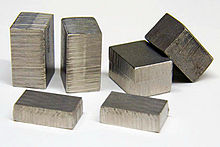

Invar, also known generically as FeNi36 (64FeNi in the US), is a nickel–iron alloy notable for its uniquely low coefficient of thermal expansion (CTE or α). The name Invar comes from the word invariable, referring to its relative lack of expansion or contraction with temperature changes,[1] and is a registered trademark of ArcelorMittal.[2]
The discovery of the alloy was made in 1895 by Swiss physicist Charles Édouard Guillaume for which he received the Nobel Prize in Physics in 1920. It enabled improvements in scientific instruments.[3]
- ^ Davis, Joseph R. (2001). Alloying: Understanding the Basics. ASM International. pp. 587–589. ISBN 0-87170-744-6.
- ^ US Trademark #63970
- ^ "The Nobel Prize in Physics 1920". nobelprize.org. The Nobel Foundation. Retrieved 20 March 2011.
The Nobel Prize in Physics 1920 was awarded to Charles Edouard Guillaume "in recognition of the service he has rendered to precision measurements in Physics by his discovery of anomalies in nickel steel alloys".